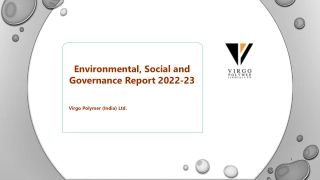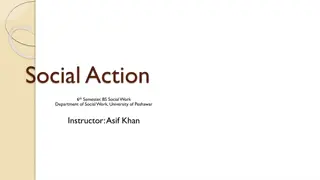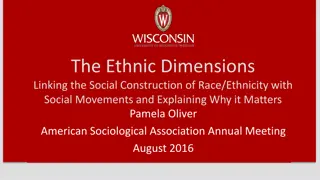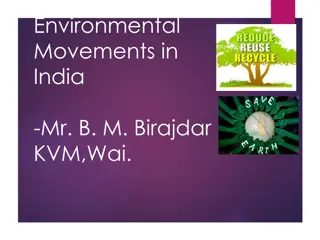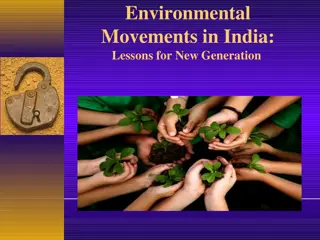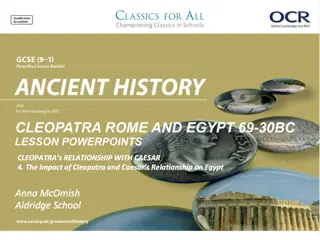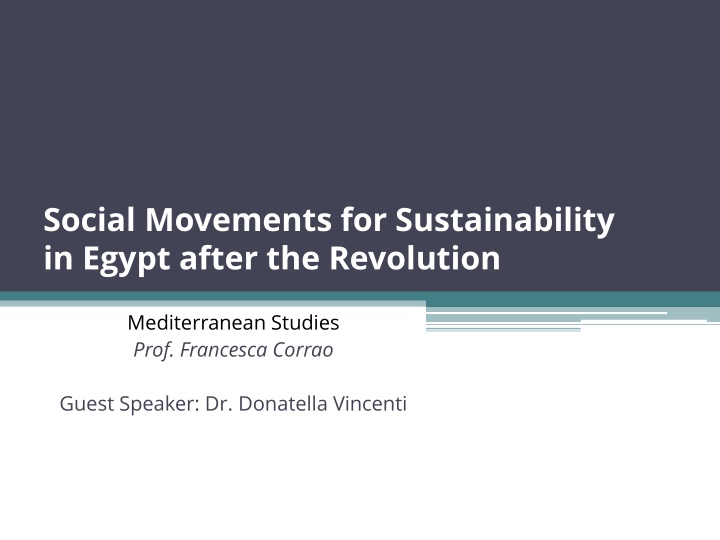
Social Movements for Sustainability in Egypt: Insights after the Revolution
Explore the emergence of social movements for sustainability in Egypt post-revolution, focusing on political and value-based movements, sustainability advocacy, citizens' engagement, environmental ethics, and the transformative potential of eco-resistance. Learn about the socio-ecological transitions and the pursuit of socio-economic and environmental justice in Egypt through collective actions.
Download Presentation

Please find below an Image/Link to download the presentation.
The content on the website is provided AS IS for your information and personal use only. It may not be sold, licensed, or shared on other websites without obtaining consent from the author. If you encounter any issues during the download, it is possible that the publisher has removed the file from their server.
You are allowed to download the files provided on this website for personal or commercial use, subject to the condition that they are used lawfully. All files are the property of their respective owners.
The content on the website is provided AS IS for your information and personal use only. It may not be sold, licensed, or shared on other websites without obtaining consent from the author.
E N D
Presentation Transcript
Social Movements for Sustainability in Egypt after the Revolution Mediterranean Studies Prof. Francesca Corrao Guest Speaker: Dr. Donatella Vincenti
2 The Emergence of Social Movements: preliminary concepts (1) Political Social Movements (PSMs). According to Della Porta and Diani (2006, 20) social movements are defined as: a distinct social process, consisting of the mechanisms through which actors engaged in collective action: - Are involved in conflictual relations with clearly identified opponents - Are linked by dense informal networks - Share a distinct collective identity. . Value-based Social Movements (VSMs) (Villumsen 2012, 7): movements conducting defensive, non-strategic social action that are normally not recognized as having transformative potential. .
3 Sustainability movements in socio-ecological transitions: preliminary concepts (2) Sustainability advocacy and post-growth strategies Dominant economic growth and nation-state [ ] practices are often based on detaching individuals from other individuals and communities environment in which their livelihoods used to be based. ( lhan 2009, I). In socio-ecological transitions value-based collective action pursues directly or indirectly social advancement goals by appealing to socio-economic/environmental justice. The concept of moral economy (Thompson 1971, 76-79; Fassin 2009, 1257). from their natural
4 Sustainability issues and citizens engagement in Egypt Transformative potential of social action for sustainability. Eco-resistance in Egypt: forms and means of political participation through collective actions: protest marches, sit-ins, green initiatives. The scope of movements for sustainability in Egypt: social justice initiatives, ecological sustainability initiatives, democracy-enhancing initiatives.
5 Environmental ethics: definitions Environmental Ethics can be defined, in very general terms, as efforts to articulate, systematize, and defend systems of value guiding human treatment of and behavior in the natural world. (Taylor 2005, 597 598). Eco-justice Ethics an ethic that holds together concerns for the natural world and for human life, that recognizes that devastation of the environment and social and economic injustice go hand in hand and that affirms that human rights and environmental rights are indivisible. (Pedersen 1998, 254; as cited in Mohamed 2012, 52).
6 Sustainability: an unitended social goal? Social change sought by movements may happen less as a result of discrete confrontations and more because of slow, long-term shifts in beliefs and values. The newer social movement theory echoes newer social theory. (Starr 2010; as cited in Villumsen 2012, 10). Social mechanisms for structural changes towards sustainability might affectpolitical processesin the long- run. The Egyptian case: contentious spaces resulting from the competition between protesting actors and regime incumbents (Vairel 2011, 27).
7 Egypt: social and environmental emergencies MSEA Report (2004; as cited in Tantawi et al. 2009, 35) indicates that Egypt is suffering from various extensive environmental problems such as air, water, soil, noise, and visual pollution, desertification, land degradation, erosion of coastal zones and coral reefs, a change in the climate threatening agriculture, population explosion, and resulting several diseases such as vector borne diseases, physiological disorders, skin cancer, eye cataracts, deaths and injuries, respiratory ailments, heat illnesses, as well as a weakening of the public health infrastructure. harmful waste disposal, strokes, and heat-related
8 Are Egyptians environmentally responsible? Policy design (whether urban or environment agendas) and weak institutional coordination can be diagnosed as endemic problems in Egypt. (Tantawi et al. 2009, 35). Green goes beyond purely environmental issues to cover issues of public health, nationalism, trade, economic development and political power. (Peattie, 1992; as cited in Tantawi et al. 2009, 30). The resolution of environmental problems depends more on the attitudes of the general public than on the knowledge of experts. (Graham, 1994; as cited in Tantawi et al. 2009, 31).
9 Civil Society Eco-initiatives in Egypt: some examples 2009-2011 [garbage collection] Clean Up Giza Facebook page 2012 [climate justice] NGO Arab Youth Climate Movement (AYCM) - The Egyptian branch took part in the Protest March organized during the UN Climate talks in Doha, Qatar (IPCC/COP-18). VIDEO 2013 [sustainable agriculture] Nawaya NGO incubated under Nahdet el-Mahrousa NGO. VIDEO
10 Lessons to be learned Another ArabRevolution is played on the ecological field. In post-revolutionary Egypt environmental movements are the most visible social movements acting on behalf of the sustainability agenda especially emphasizing environmental justice*. (Agyeman 2004; as cited in Villumsen 2012, 10). *A rights-based approach to environmental justice: Environmental justice can be defined as an ideal of accountability and fairness in the protection and vindication of rights and the prevention and punishment of wrongs related to the impacts of ecological change on the poor and vulnerable in society. (Khoday and Perch 2012, 1).
11 References: Agyeman, J, Evans, B. 2004. JustSustainability : The Emerging Discourse of Environmental Justice in Britain. Geographical Journal 170(2), 155 164. Della Porta, D. and Diani, M. 2006. Social Movements. An Introduction, 2nd edition. Oxford: Blackwell Publishing Ltd.. Fassin, Didier. 2009. Les conomies morales revisit es. Annales HSS 64, 1237 1266. Graham, C. 1994. The Mass Media and Global Environmental Learning, http://www.esrc.ac.uk/my-esrc/grants/L320253059/read [Accessed: February 1, 2014]. lhan, A. 2009. Social Movements in Sustainability Transitions. Identity, Social Learning & Power in the Spanish and Turkish Water Domains, Ph.D. Diss. Universitat Autonoma de Barcelona UAB Institut de Ci ncia i Tecnologia Ambientals ICTA Barcelona, http://www.tdx.cat/bitstream/handle/10803/5817/ai1de1.pdf?sequence=1 [Accessed: February 15, 2014]. Khoday, Kishan, and Leisa Perch, Green Equity: Environmental Justice for more Inclusive Growth.? Research Brief n. 12. Brasilia, DF - Brazil, International Policy Centre for Inclusive Growth - United Nations Development Programme (IPC-UNDP), May 2012, http://www.ipc-undp.org/pub/IPCPolicyResearchBrief19.pdf [Accessed: January 13, 2014]. Ministry of State for Environmental Affairs (MSEA). 2003. Egyptian Environmental Affairs Agency (EEAA), Country Analysis Briefs, Environmental International Agency. August (2003). Egypt: Environmental issue, http://www.eia.doe.gov/emeu/cabs/egypenv.html [Accessed: March 13, 2014]. Mohamed, Najma. 2012. Revitalising an Eco-Justice Ethic of Islam by way of Environmental Education: Implications for Islamic Education. Ph.D. Diss., Stellenbosch University, South Africa. Peattie, K. 1992. Green Marketing, The M&E Handbook series. London, UK: Pitman Publishing. Starr, A. 2010. Local Food: A Social Movement? Cultural Studies and Critical Methodologies 10(6), 479 490. Tantawi, P., O Shaughnessy, N, Gad, K., and Ragheb A.S. 2009. Green Consciousness of Consumers in a Developing Country: A Study of Egyptian Consumers. Contemporary Management Research 5(1), 29 50, http://www.cmr-journal.org/article/viewFile/1149/2642 [Accessed: February 3, 2014]. Taylor, Bron. 2005. Environmental Ethics . Encyclopedia of Religion and Nature. London & New York: Continuum. Thompson, Edward P. 1971. The Moral Economy of the English Crowd in the Eighteenth Century. Past & Present 50, 76 136. Vairel, Fr d ric. 2011. "Protesting in Authoritarian Situations: Egypt and Morocco in Comparative Perspective." In Social Movements, Mobilization, and Contestation in the Middle East and North Africa, Joel Beinin and Fr d ric Vairel (eds.), Stanford: Stanford University Press, 27 42. Villumsen, S. 2012. Habermas in the Garden. Broadening the Scope of Social Movements for Sustainability. Master Thesis Series in Environmental Studies and Sustainability Science, Lund University (Sweden), International Master s Program in Environmental Studies and Sustainability Science.

![[PDF⚡READ❤ONLINE] Tutankhamun's Trumpet: Ancient Egypt in 100 Objects from the](/thumb/20549/pdf-read-online-tutankhamun-s-trumpet-ancient-egypt-in-100-objects-from-the.jpg)
